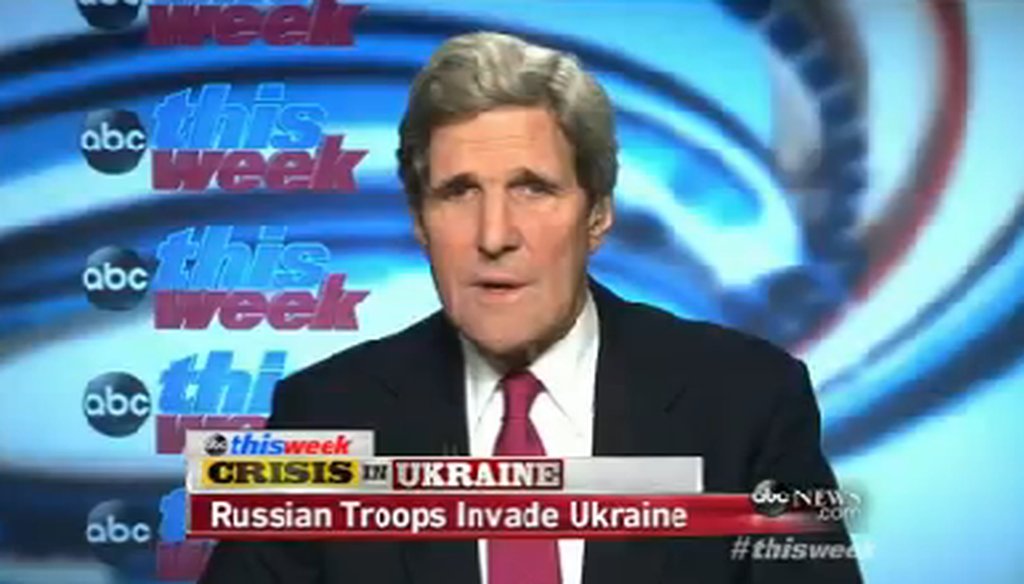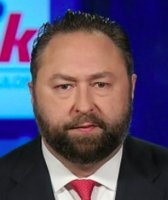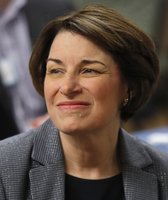Get PolitiFact in your inbox.

Secretary of State John Kerry talked about the crisis in Ukraine on ABC's "This Week."
Secretary of State John Kerry on Sunday warned Russia about possible economic sanctions if it continued to intervene militarily in Ukraine.
In separate interviews on ABC, NBC and CBS, Kerry said the United States and its allies are prepared "to isolate Russia" if it continues to keep troops on southern Ukraine's Crimean Peninsula.
Russian President Vladimir Putin has said the troops are there to protect the Russian people who live there.
"There are very serious repercussions that can flow out of this," Kerry said on CBS’ Face the Nation. "There are a broad array of options that are available. … I spent yesterday afternoon on the phone with many of my counterparts … and all of them, every single one of them are prepared to go to the hill order to isolate Russia with respect to this invasion.
"They’re prepared to isolate Russia economically," Kerry continued. "The ruble is already going down. Russia has major economic challenges."
As the world’s western powers debate what to do with Russia going forward, we wanted to look at the current state of Russia’s economy by fact-checking Kerry’s statement that "the ruble is already going down."
That rates Mostly True.
Kerry is right to say that the ruble has declined -- its value has tumbled by 15 percent in the past year. But its decline is partly because that’s what the Russians wanted.
In the middle of last year, the Russian Central Bank announced it wanted to get out of the business of setting the ruble’s value on the international market. It had in mind a gradual glide path for the currency’s fall, and in October, it gave the ruble even more leeway.
The country’s economy grew less than 2 percent last year, and Russia has struggled to keep inflation in check.
That said, the violence and political turmoil in Ukraine is also taking a toll. Russian banks have about $28 billion in loans in the country. Before the Russian troops moved in, investors were worried. Last week, two of the largest banks in Russia said they would suspend any new lending in Ukraine.
Ties of another kind between Russia and Ukraine also were discussed Sunday.
On Fox News Sunday, U.S. Rep. Mike Rogers, the Republican chairman of the House Intelligence Committee, said he believes Russia wants to essentially annex Crimea.
"I would believe that the Russians would love to see the Crimea as part of the Russian Federation," Rogers said. "It was there until 1954 when it was given to the Soviet Republic of the Ukraine. I think they’d like it back."
The Washington Post’s David Ignatius made a similar claim on Face the Nation. "Crimea became part of Ukraine only in 1954," Ignatius said. "Crimea was historically part of Russia, and (Soviet leader Nikita) Khrushchev gave it to Ukraine in a gesture that mystified some people."
Both claims rate True.
Crimea is an eastern Ukrainian peninsula located on the Black Sea. It’s connected to the rest of the country by a small strip of land. Out of its 2 million residents, about 60 percent consider themselves Russian.
For much of the past 300 years, Crimea was part of Russia or the Soviet Union. In 1954, Russian Premier Nikita Khrushchev transferred what was then called the Crimean Oblast to Ukraine. It’s often reported that it was a gesture of goodwill from Khrushchev, who had Ukrainian roots.
When the Soviet Union collapsed in 1991, many observers expected President Boris Yeltsin, the new president of the Russian Federation, to take Crimea for Russia. But he didn’t bring it up during negotiations with Ukraine. In 1997, the two countries signed a treaty allowing Russia to keep its naval fleet in Crimea.
Staff writers Jon Greenberg and Julie Kliegman contributed to this report. Aaron Sharockman is the editor of PunditFact.com.
Our Sources
See individual fact-checks.




























